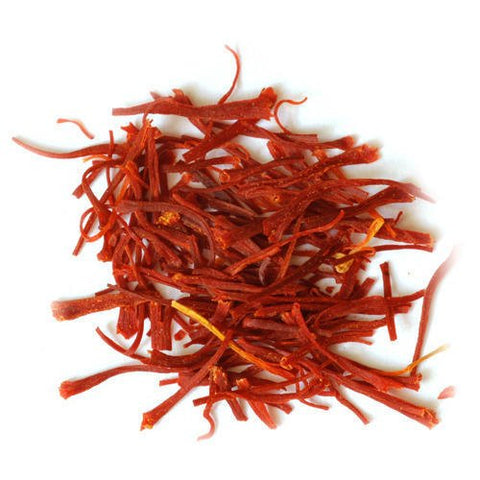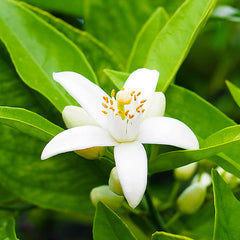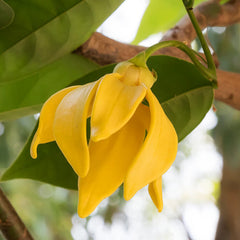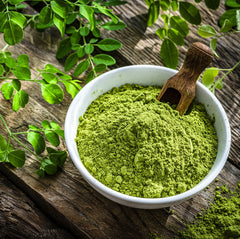What Does Saffron Smell Like?
As An Amazon Associate We Earn From Qualifying Purchases At No Extra Cost To You

Saffron, known as the "golden spice," is a culinary treasure cherished for its distinct flavor and vibrant hue. Join us as we explore the question: What does saffron smell like? Let's unravel the aromatic allure of saffron and delve into its olfactory nuances.
What Does Saffron Smell Like?
The fragrance of saffron is a captivating symphony of warm, floral, and earthy notes, creating a sensory experience that mirrors its rich culinary profile. Imagine a fragrant embrace where floral elegance meets a subtle earthiness, all wrapped in a warm and inviting aroma. Saffron's scent is an ode to its exotic origins, inviting you to explore its aromatic tapestry.
Saffron's Floral Elegance
As you approach saffron, the first olfactory impression is a delicate dance of floral elegance. Picture the sweet and heady notes reminiscent of blooming flowers, a fragrance that exudes sophistication and warmth. Saffron's floral tones add a touch of refinement to its overall aroma, creating an inviting and enchanting olfactory experience.
Warm and Inviting: A Fragrant Embrace
The scent of saffron is like a warm and inviting embrace, drawing you into its aromatic world. The richness of the fragrance unfolds with a subtle spiciness, creating a comforting and alluring atmosphere. Saffron's warm notes contribute to its complex and enticing olfactory profile, making it a standout in the world of aromatic spices.
Earthy Undertones: A Touch of Terroir
Delve deeper into saffron's scent, and you may encounter earthy undertones that ground the fragrance. These earthy notes add depth and complexity, reminiscent of the spice's natural origins. Saffron, with its roots in the earth, captures the essence of the land in its aromatic symphony.
Subtle Sweetness: Gourmet Aromatics
While predominantly warm and earthy, there's a subtle undercurrent of sweetness in saffron's scent. This gourmet sweetness elevates the overall fragrance, creating a harmonious blend that is both indulgent and refined. Saffron's aroma is a delightful fusion of floral, warm, and sweet notes, making it a prized ingredient in perfumery.
Aromatic Harmony: Essence of Saffron Threads
Imagine the scent of saffron threads gently releasing their essence—a fragrant harmony that encapsulates the spice's true character. Saffron's aromatic symphony is a celebration of its culinary legacy, a sensory journey that unfolds with every captivating whiff.
Factors Influencing the Scent of Saffron Fragrance Oil
Just as with calamansi, saffron fragrance oil is a carefully crafted composition designed to capture the essence of this culinary gem. Here are several factors that contribute to the intricate and enticing scent of saffron fragrance oil:
-
Fragrance Composition: Saffron fragrance oil is a meticulously blended mixture of various aromatic compounds, chosen to replicate the characteristic scent of saffron. This composition may include both synthetic and natural ingredients to achieve the desired olfactory profile.
-
Saffron Essence: At the heart of the fragrance lies the essence of saffron. Notes of warm florals, earthiness, and subtle sweetness are intricately blended to mirror the spice's captivating aroma.
-
Synthetic vs. Natural Components: Saffron fragrance oil often combines both synthetic and natural ingredients. Perfumers make choices to strike a balance between authenticity, cost considerations, and sustainability in the selection of these components.
-
Extraction Method: The method used to create saffron fragrance oil, whether through distillation or extraction, plays a crucial role in defining the aromatic profile. Specific extraction methods contribute to the faithful recreation of the warm and floral scent.
-
Additional Spicy and Gourmet Notes in the Blend: The fragrance may incorporate additional spicy elements or subtle gourmet notes to enhance complexity. These complementary notes contribute to the overall richness of the scent, capturing the essence of saffron.
-
Quality of Ingredients: The quality of raw materials, including the source of essential components, directly influences the warmth and authenticity of the saffron scent in the fragrance oil.
-
Perfumer's Artistry: The expertise and creativity of the perfumer or fragrance creator are crucial. Perfumers leverage their skills to balance different components, creating a distinctive and delightful saffron fragrance.
-
Regulatory Compliance: Adherence to regulatory standards and restrictions on certain fragrance ingredients is crucial. Compliance with safety guidelines requires careful consideration of ingredient choices to ensure the fragrance is safe for use.
-
Usage in Products: Saffron fragrance oil can be incorporated into various products, including perfumes, candles, room sprays, and bath products. The interaction with other ingredients in specific product formulations can influence how the saffron scent is perceived.
-
Product Type and Concentration: The concentration of saffron fragrance oil in a product affects the strength and longevity of the scent. Higher concentrations may be suitable for perfumes, while lower concentrations work well for candles, soaps, or room sprays.
-
Storage Conditions: Proper storage conditions for saffron fragrance oil, both before and after formulation, are essential to maintain its stability and scent. Storing it in a cool, dark environment helps preserve the freshness of the fragrance.
-
Consumer Preferences and Trends: Formulations of saffron fragrance may adapt to changing consumer preferences and market trends. The popularity of warm and gourmet scents may influence product formulations.
-
Artisanal vs. Commercial Production: Differences between artisanal and commercial production of saffron fragrance oil may impact ingredient sourcing, formulation, and overall quality. Artisanal methods may emphasize craftsmanship and unique blends.
-
Post-Formulation Processing: Additional processes, such as aging or filtering after the formulation of the fragrance oil, may influence the final scent and contribute to the desired characteristics.
What to Look for When Choosing Saffron Fragrance Oil
Selecting a saffron fragrance oil allows you to embrace the warm and inviting aroma of this culinary delight. Whether used in perfumes, candles, or personal care products, consider these factors to ensure you choose a high-quality and authentic saffron fragrance oil:
-
Warm and Floral Authenticity: Seek a saffron fragrance oil that authentically captures the warm, floral, and earthy scent of real saffron. Look for a fragrance that embodies the unique notes characteristic of quality saffron.
-
Natural vs. Synthetic: Determine whether the fragrance oil is derived from natural sources or is synthetically produced. Natural saffron oils can provide a more nuanced and realistic scent, closely resembling the aroma of actual saffron.
-
Blend Ingredients: Check the blend of ingredients in the fragrance oil. A well-crafted combination of natural and synthetic components can contribute to a balanced and long-lasting saffron fragrance.
-
Intensity Level: Consider the intensity level of the saffron fragrance. Some may prefer a subtle and warm scent, while others may desire a more pronounced and inviting aroma. Look for a fragrance that aligns with your desired level of intensity.
-
Versatility: Choose a fragrance oil that is versatile and suitable for various applications. Whether used in perfumes, candles, lotions, or diffusers, versatility allows you to enjoy the warm and floral scent in different settings.
-
Packaging: Assess the packaging of the fragrance oil. Opt for a bottle that is dark or opaque to protect the oil from light exposure, preserving its freshness and preventing deterioration over time.
-
No Residue or Discoloration: Ensure that the saffron fragrance oil leaves no residue or discoloration when incorporated into different products. A high-quality oil should seamlessly integrate into various mediums without causing unwanted effects.
-
Manufacturer Reputation: Research the reputation of the manufacturer or brand. Choose well-established brands with positive reviews, as they are more likely to produce reliable and high-quality fragrance oils.
-
Testing Options: Look for fragrance oils that offer testing options or sample sizes. This allows you to experience the scent firsthand before committing to a larger quantity, ensuring it aligns with your preferences.
-
Ethical and Sustainable Practices: Consider the manufacturer's commitment to ethical and sustainable practices. Brands that prioritize responsible sourcing and environmentally friendly production contribute to a more conscientious choice.
By considering these factors, you'll be better equipped to choose a saffron fragrance oil that not only aligns with your preferences but also ensures a high-quality and aromatic experience in your chosen applications.
Where to Find Reputable Saffron Fragrance Oils
Now that you're ready to embark on your saffron-scented journey, here are some places where you can find reputable saffron fragrance oils:
-
Specialty Candle and Soap Supply Stores: Explore specialty stores dedicated to candle-making and soap supplies, as they often carry a variety of fragrance oils, including unique scents like saffron.
-
Online Fragrance Oil Retailers: Browse reputable online platforms specializing in fragrance oils. Websites and retailers dedicated to aromatherapy, candle making, or DIY crafting may have an extensive selection of saffron fragrance oils.
-
Artisanal or Handmade Markets: Attend artisanal markets or craft fairs where independent sellers showcase handmade products. Artisan vendors may create unique and carefully crafted saffron fragrance oils, providing an opportunity to explore distinct options.
-
Local Essential Oil or Perfume Shops: Specialty shops focusing on essential oils or perfumes may carry saffron fragrance oils. These stores often prioritize high-quality scents and may offer a range of exotic and gourmet aromas.
-
Online Marketplaces: Platforms like Etsy or other online marketplaces featuring handmade or artisanal products can be sources for saffron fragrance oils. Look for sellers with positive reviews and detailed information about their products.
-
Aromatherapy Stores: Aromatherapy stores often carry a variety of fragrance oils for different applications. Inquire about the availability of saffron scents to add a warm and inviting aroma to your living space.
-
Local Farmers' Markets or Herbal Shops: Check with local farmers' markets or herbal shops that specialize in natural products. Some of these establishments may offer fragrance oils with botanical scents, including saffron.
-
Specialty Perfume Retailers: Explore specialty perfume shops that focus on unique and exotic fragrances. These stores may carry saffron fragrance oils known for their warm and gourmet notes.
-
Word of Mouth: Seek recommendations from friends, family, or members of fragrance communities for trusted sources of saffron fragrance oils. Personal experiences and suggestions can guide you to reputable suppliers known for quality and authenticity.
-
Check Ingredients and Descriptions: Before making a purchase, carefully read product descriptions and check ingredient lists for saffron fragrance oils. Authentic and reputable sellers provide clear information about the composition and intended use of their products.
Note: Saffron fragrance oils can bring a warm and inviting note to your DIY projects. Ensure that the fragrance oil you choose aligns with your intended use, whether it's for perfumes, candles, diffusers, or other creative endeavors. Follow safety guidelines provided by the manufacturer for proper usage.
20 Questions and Answers about Saffron
-
What is saffron?
- Saffron is a spice derived from the flower of Crocus sativus, commonly known as the saffron crocus. It is renowned for its vibrant color, distinctive flavor, and aromatic properties.
-
How is saffron used in perfumes?
- Saffron is used in perfumery for its unique and rich aroma. It adds a warm, spicy, and slightly floral scent to fragrances.
-
What does saffron smell like in perfumes?
- Saffron in perfumes often imparts a warm, leathery, and slightly sweet scent. It can have a complex aroma with hints of hay, honey, and floral undertones.
-
Is saffron a common note in perfumery?
- Saffron is not as common as some other perfume notes, but it is highly valued for its distinctiveness and is used in various high-end and niche fragrances.
-
Does saffron have any symbolic significance in perfumery?
- Saffron is sometimes associated with luxury, opulence, and exoticism in perfumery. Its rarity and rich history contribute to its symbolic significance.
-
How is saffron harvested for perfumery?
- Saffron is harvested by carefully collecting the red stigmas of the saffron crocus flower. It is a labor-intensive process as each flower produces only a few threads, and a large quantity is needed to yield a small amount of saffron.
-
Are there different varieties of saffron used in perfumery?
- While there are different varieties of saffron, the most commonly used in perfumery is Persian saffron, known for its high quality and intense aroma.
-
What other fragrance notes complement saffron?
- Saffron pairs well with various notes such as rose, oud, vanilla, sandalwood, and spices like cardamom and cinnamon in perfumery.
-
Can saffron be a dominant note in a perfume?
- Yes, saffron can be a dominant note in a perfume, especially in fragrances where its unique characteristics are highlighted.
-
Is saffron used more in men's or women's perfumes?
- Saffron is a versatile note used in both men's and women's perfumes. Its warm and spicy character makes it suitable for a range of fragrance compositions.
-
Are there any cultural or historical associations of saffron in perfumery?
- Saffron has a long history of use in various cultures, and its inclusion in perfumery may evoke a sense of tradition, luxury, and cultural richness.
-
Can saffron be synthetic in perfumes?
- Yes, saffron can be synthesized in perfumery to replicate its aroma. Synthetic saffron notes are often used to enhance and complement natural saffron.
-
Does saffron have any skincare benefits in perfumes?
- While saffron is not primarily used for skincare benefits in perfumes, some believe that its antioxidant properties may contribute to a feeling of well-being and luxury.
-
Can saffron be overpowering in a fragrance?
- Saffron, when used in the right proportions, adds depth and complexity to a fragrance. However, like any potent ingredient, it can be overpowering if not balanced properly.
-
Are there any famous perfumes that prominently feature saffron?
- Some well-known perfumes featuring saffron include Tom Ford's Tuscan Leather, Amouage's Jubilation XXV, and Maison Francis Kurkdjian's Baccarat Rouge 540.
-
Is saffron commonly used in niche perfumery?
- Yes, saffron is frequently used in niche perfumery, where perfumers often experiment with unique and exotic ingredients to create distinctive fragrances.
-
Does the quality of saffron impact the fragrance?
- The quality of saffron can significantly impact the fragrance. High-quality saffron with intense aroma and color will contribute more to the overall olfactory experience.
-
Can saffron be blended with citrus notes in perfumery?
- Yes, saffron can be blended with citrus notes to create a vibrant and refreshing fragrance. The warmth of saffron complements the brightness of citrus notes.
-
Does saffron have any therapeutic properties in perfumes?
- While saffron is not primarily used for therapeutic purposes in perfumes, its rich and exotic scent may contribute to a sense of well-being and luxury.
-
Can saffron be found in other beauty products besides perfumes?
- Yes, saffron is used in various beauty products such as skincare creams and hair treatments for its potential antioxidant properties and its luxurious aroma.
Buy Perfumes - Best Online Retailers
Click For Affordable Inspired Perfume Alternatives
Click For The Best Niche Perfumes & Decants
Pheromone Perfumes - Confidence, Attraction & Appeal - Click For More
Home Fragrances & Candle Warmers - Click To Scent Up Your Spaces Today!



